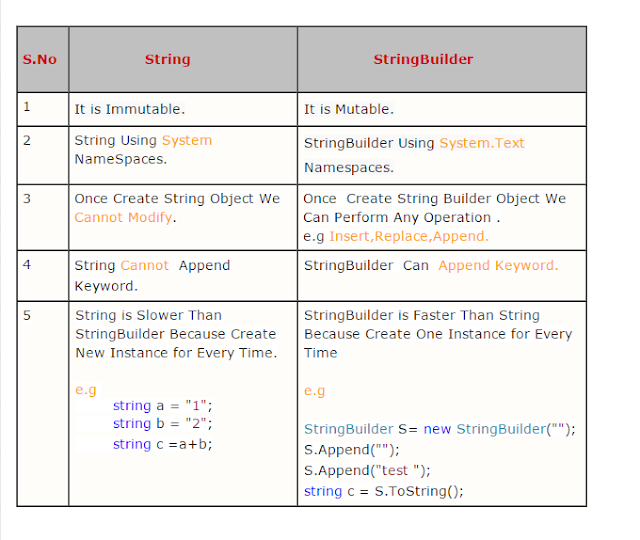What is the primary difference between string and StringBuilder in C#?
The primary difference between `string` and `StringBuilder` is how they handle string manipulation. A `string` in C# is immutable, which means that every time you modify a string, a new string object is created in memory. `StringBuilder`, on the other hand, is mutable and designed specifically for efficient string manipulation without creating new objects.
When should you use string over `StringBuilder ?
You should use string when you have a relatively small number of string concatenations or modifications, and memory usage is not a critical concern. For simple operations, string is simpler to work with.
When should you use StringBuilder over string ?
You should use `StringBuilder` when you need to perform a significant number of string manipulations, concatenations, or modifications. `StringBuilder` is more memory-efficient in such scenarios as it doesn't create new string objects for each modification, thus reducing memory overhead and improving performance.
How does immutability of `string` affect memory usage and performance?
Since `string` is immutable, any modification results in the creation of a new string object, leading to increased memory usage and potentially causing performance issues when dealing with a large number of string manipulations. This can also contribute to memory fragmentation.
Can you convert a `StringBuilder` to a `string`?
Yes, you can convert a `StringBuilder` to a `string` using the `ToString()` method of the `StringBuilder` class. This method returns the current content of the `StringBuilder` as a string.
Can strings be modified in C#?
No, strings are immutable in C#. Once created, their value cannot be changed. However, you can use a StringBuilder to efficiently modify strings if needed.
What is the difference between value types and reference types in C#?
Value types are stored on the stack, while reference types are stored on the heap. Value types store the actual value, whereas reference types store a reference to the value. Value types include simple types like int, float, etc., and structs. Reference types include classes, interfaces, delegates, and strings.
What is stack memory and heap memory in C#?
In C#, memory is managed through two primary areas: the stack and the heap. These two areas serve different purposes and have distinct characteristics.
Stack:
- Usage: The stack is primarily used for storing local variables and managing function call information, including return addresses and parameters.
- Memory Management: Memory allocation and deallocation on the stack are automatic and fast. When a function is called, a new stack frame is created for that function's local variables and parameters. When the function exits, its stack frame is automatically removed, freeing up the memory.
- Data Type: Value types are stored on the stack. Value types directly contain their values and are usually smaller in size.
- Access Time: Accessing memory on the stack is faster compared to the heap, as it involves simple pointer manipulation.
- Lifetime: The lifetime of data on the stack is limited to the scope of the function or block in which it is defined. When the function or block ends, the memory is automatically deallocated.
Heap:
- Usage: The heap is used for dynamic memory allocation, primarily for objects whose size cannot be determined at compile time or for reference types.
- Memory Management: Memory allocation and deallocation on the heap are manual. Developers need to manage memory using techniques like garbage collection (automatic memory management) or explicitly allocating and deallocating memory.
- Data Type: Reference types (objects, arrays, etc.) are stored on the heap. Reference types store a reference (a pointer) to the memory location of the actual data.
- Access Time: Accessing memory on the heap involves an additional level of indirection due to the reference. This makes heap memory access slightly slower compared to the stack.
- Lifetime: The lifetime of data on the heap is longer and can extend beyond the scope of the function or block where it was created. It relies on memory management mechanisms to determine when memory should be released (usually through garbage collection).
How is memory allocated and deallocated for value types and reference types in C#?
Value types are usually allocated on the stack and deallocated automatically when they go out of scope. Reference types, however, are allocated on the heap, and memory for them is managed by the garbage collector. The garbage collector automatically determines when objects are no longer needed and frees up their memory.
String vs StringBuilder:
string str = "Hello";
str += " World"; // This creates a new string object
StringBuilder sb = new StringBuilder();
sb.Append("Hello");
sb.Append(" World"); // This modifies the underlying character sequence
Value Types vs Reference Types:
// Value type (stored on the stack)
int value1 = 10;
int value2 = value1;
// Reference type (stored on the heap)
StringBuilder sb1 = new StringBuilder("Hello");
StringBuilder sb2 = sb1;
sb2.Append(" World"); // Modifying sb2 also modifies sb1
Stack Memory and Heap Memory:
// Stack memory
int number = 5;
string name = "John";
// Heap memory
StringBuilder sb = new StringBuilder("Hello");


.gif)



No comments:
Post a Comment